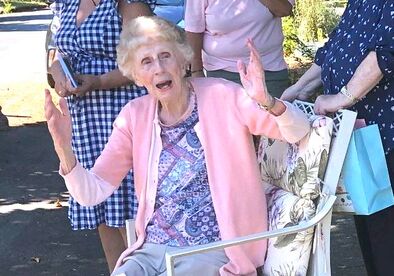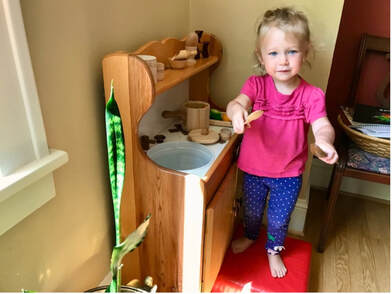I invite those of you who are grandparents to stand. I just want to warn the rest of you that these are the ones who have pictures at the ready on their phones, anxious to share with you. Indulge them, er, us, please! Speaking of which, I think this occasion is more than adequate excuse to tell you just a little bit about my granddaughter, Aleda. She’s two, and she spends each Thursday with Rene and me at our house. She loves coming to Grandma and Papa’s, and of course, so do we. She’s very comfortable in our house and she’s completely herself with us. We have our routines: Walk to the park to swing and slide. Wash hands (and feet) in the bathroom sink. Read books. Play with toys. Take a nap. Take a stroller ride. Part of the routine each Thursday centers around lunch and dinner. She loves to watch Rene (or me) prepare the meal, and she’ll even help out sometimes. We sit. We say a little prayer. We eat. Berries, cheese, crackers, and pasta – she’ll eat with voracious enthusiasm. Anything green, however, you know, like vegetables . . . not too interested. And then after lunch, she will go over to her “kitchen” and prepare a scrumptious soup or stew for all three of us. It’s all pretend, of course, but she will bring Rene and me each a taste of her dish. And one of us will say, “Hmmmm, add a pinch of salt,” or “needs a bit of tarragon.” Just for fun, I might say, “Add a half cup of chocolate chips!” And she’ll run right back to her pot, make the adjustments, and bring us another taste. She wants it to be just right.
More importantly, she’s learning some things about hunger, and how to satisfy it. She’s learning that while others have always satisfied her hungers – mom, dad, grandma & papa, she can also satisfy the hunger of others. And she wants to do it just right. Isn’t that just like a child? Isn’t that just like a person whose generous heart has never been bruised? Isn’t that just like the person discovering for the first time the joy of giving? Isn’t that just like how God is portrayed in our readings today? God desires to satisfy our hungers in an abundant way. I love that line in the first reading where Elisha said, “They shall eat and there shall be some left over.” Out of a few barley loaves, a hundred people ate, and there was some left over. This is, of course, a precursor to our gospel story where Jesus fed 5000 people on just five loaves and two fish . . . and there was an abundance of leftovers. We know this story/event was very important to all the early Christian communities because it is the only miracle story that appears in all four gospel accounts. Today, we hear it from John, but it also appears in Matthew, Mark, and Luke. And pay close attention to the gospel stories coming in the next few weeks as we explore in John what is known as the “bread of life” discourse—which will break open for us the gift and the meaning of the Eucharist itself. Why did Jesus feed them? Because they were hungry. It really is that simple. The refrain of today’s psalm rings true and clear: “The hand of the Lord feeds us; answers all our needs.” God desires to satisfy our hungers in a big way, in abundance. This is, really, what the Eucharist is all about. The word itself means thanksgiving. Each Sunday we come together filled with gratitude for the abundant ways God seeks to satisfy our needs. I am not a sacramental theologian, and certainly no expert on the Eucharist. But there are few things I can say with confidence that, at this point in time, I believe need to be said: The Eucharist cries out to be reverenced. Indeed, reverenced in much the same way that when little Aleda brings me a taste of her stew, I am filled with awe and gratitude for what she has created. And so today, when you come forward to receive the holy Body of Christ, say your “Amen” with genuine gratitude and joy from the heart. At the same time, however, the Eucharist is as much about those of us gathered to share in the meal, as it is about the bread and wine consumed. The grace of the sacrament is broken open and shared by the community. If there is only one, there is no Eucharist. “Where two or more are gathered . . .” Even when we take Communion to the sick and home bound, we bring the community with us. We also bring a parish bulletin, and share all he latest news. The Eucharist comes with “leftovers.” There should be an abundance of leftovers in our hearts to send us out from this place to care for those in need, comfort those who are troubled, and reconcile with those whom we’ve hurt, and forgive those who have hurt us. The Eucharist cries out be understood. We have a responsibility to catechize one another as to its meaning and significance in our walk of faith. To that end, I encourage you to complete the Sacraments component posted in the “Personal Journey in Faith” playlist as part of the Spiritual Growth Challenge on our website. You can earn a badge! Yea! Finally, I believe the Eucharist was never envisioned as a weapon to wield against public political figures for their stance on issues of the day. In the eyes of those who watch us from the sidelines, there is nothing to be gained and a whole lot to lose by going down that road. Rather, the Eucharist, particularly in the substance of the community gathered, is envisioned as beacon of light, that, over time, can soften hearts and bring about genuine conversion. As for who should or should not receive the Eucharist? I’m going to go with the recent words of Pope Francis, “The Eucharist is not the reward of saints, but the bread of sinners.” So, whether you are two, like Aleda, or 100, like Jeanne, God seeks to satisfy our hungers . . . with abundance.
0 Comments
Leave a Reply. |
Archives
October 2023
Categories |



 RSS Feed
RSS Feed